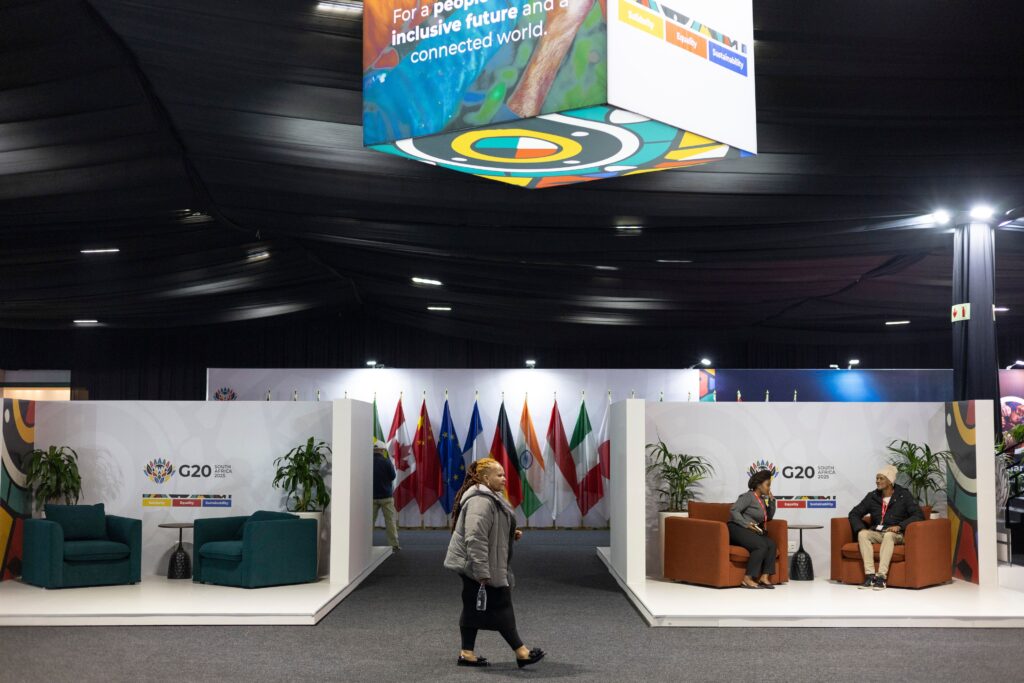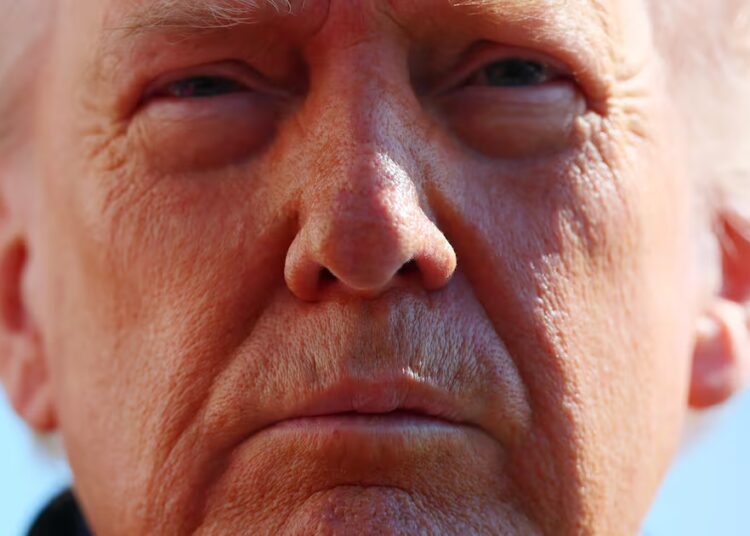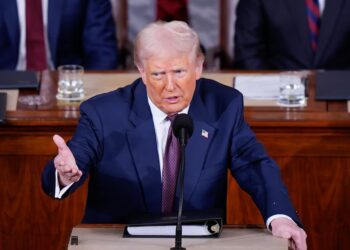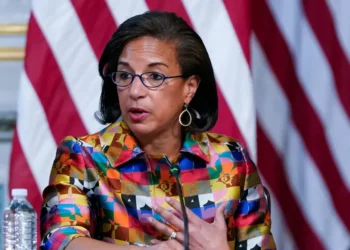In Johannesburg this weekend, the world’s major economies are gathering to grapple with the most crucial global challenges of the day. All the big powers except the United States, that is.
Not only will President Donald Trump not be in attendance at the Group of 20 leaders’ summit, but the U.S. chair will be wholly vacant for the first time in the 26-year history of the bloc — an absence that speaks not just of Trump’s distaste for complicated, multilateral gatherings, but also the White House’s specific animus toward South Africa. In a social media post last week, Trump said it was a “disgrace” that South Africa was hosting the gathering, repeating the false allegations he has raised through the year about the treatment of White Afrikaner farmers in the country.
South African President Cyril Ramaphosa responded that it was the U.S.’s “loss,” but Trump still seems intent on playing spoiler, with the U.S. undermining various attempts to create consensus at the summit. Diplomats from other countries cast U.S. actions as that of a saboteur or vandal.
The standoff comes at a moment of pronounced global crisis and anxiety. Ahead of the G-20 leaders’ summit, Ramaphosa tasked a committee of experts to present a report on the state of economic inequality around the world. Its findings were grim: A quarter of humanity (some 2.3 billion people) face moderate or severe food insecurity, compared to just 335 million in 2019; gaps in wealth have accelerated over the past quarter century, with 90 percent of the world’s population living in societies shaped by high economic inequality.
The report stresses that these outcomes are a “policy choice” and can be reversed. But there’s minimal global momentum toward the type of progressive taxation and other redistributive measures that states could deploy to rein in income and wealth divides. Instead, the special G-20 committee wants to see the creation of an international panel on inequality that functions similarly to the U.N.’s Intergovernmental Panel on Climate Change, where top scientists track the scale of the planetary threat and issue advisories regarding the state of the world.
The new initiative will be unveiled Saturday at the G-20, and already has the backing of some governments — including Spain, Brazil and South Africa — some 600 leading economists and 30 former world leaders. I spoke to Joseph Stiglitz, the Nobel-winning economist who presented the inequality report to Ramaphosa, on the effort and what’s at stake at the G-20. Our conversation was edited for length and clarity.
What does the White House’s absence from the G-20 summit tell us about this moment?
The sense that global cooperation has never been lower. The United States played a critical role in the founding of the U.N., a very big role in founding the G-20. The United States played a very big role in helping create the rules-based order. Now, it’s very clear the United States is stepping back in many ways in the trade arena, undermining the rules based order.
It’s obviously a very disturbing moment when the single largest country is not playing cooperatively — when we’re facing climate change and an inequality crisis. We’ve just been through a pandemic. There are a very large number of challenges, and yet the single [most powerful] country is not even participating in the discussions. At the same time, the rest of the world is cooperating together. They do realize climate change is real. There is almost a renewed sense of solidarity. Maybe because the United States is not cooperating, there’s a greater resolve for the rest of the world to work together.
The question of rising inequality has been discussed at major summits and gathering for more than a decade-and-a-half. What makes it urgent now?
The issue has been building up, you might say. There is certainly a risk of it getting much larger with AI. So anxieties are obviously very high. We uncovered new data that reinforced the magnitude of a challenge. We pointed out that 41 percent of the increase in the wealth over the last 25 years has gone to the top 1 percent, while the bottom 50 percent got 1 percent of the wealth. The striking increase in the role of inherited wealth is really changing our perspective of what is going on. In the United States, there’s a sense of a new oligarchy that’s being created. So I think the answer in a way is that trends that have been going on have just reached a level where people feel like it’s really something that has to be addressed, and it’s likely to get worse unless we do something about it.
Affordability seems to be a political issue for parties of all stripes in various democracies. How much international political unity do you see on this?
I would say President Ramaphosa identified something that is in the zeitgeist of the moment. It’s a concern in governments all over the world, on both the left and the right. It’s an issue across the spectrum. [When it comes to] climate change, there are a few climate deniers. I don’t think there’s any inequality deniers.
There are people that say there’s always going to be inequality. But there’s not always been the extremes of inequality that we have. And that’s one of the major points that we make in our report. It’s in part a consequence of the policies that we adopted, and that different policies would result in different levels of inequality.
How does Trump’s approach — from his domestic legislation, to his trade wars, to his antipathy to climate action and courting tech oligarchs and fossil fuel giants — fit into this equation?
We know that the tariffs are a tax disproportionately on low and middle income [people], a regressive sales tax. These will exacerbate inequality. We know that climate change has disproportionate effects on the poor, so we know in that dimension they’re going to be hurt. We know that there’s been an enormous concentration of market power, particularly in the tech sector. And market power is associated with the increase of concentration of wealth at the top and at the expense of the rest of society. So that’s more inequality again.
What sort of outcome do you hope to see at the G-20?
The main recommendation of our report is that there should be the creation of this international panel of inequality. We believe that it was important that there be better information about inequality, its trends, its drivers, and the range of policies that might address it. One of the things that we do emphasize is that inequalities in one country can have effects on others — migration, pandemics, there are cross border effects. It’s not just a national issue.
And the second thing is that the international rules of the game play a very big role in determining inequalities, both between and within countries. In the U.S., when we look at any bill, you ask, what is the incidence? How does it affect people in each decile? Internationally, we haven’t been doing that. And hopefully that would be one of the roles that this international panel on inequality could help serve.
You mentioned the advance of AI. Could you elaborate on your concerns?
AI is very rapid, and we know that very rapid labor markets don’t adjust well. We we’ve had 40 years of deindustrialization, and we’ve seen how difficult it’s been for some parts of the country to adjust to that, and AI is happening just much more rapidly. But even in the longer term, we don’t have the answer to the question of what will be the financial models that will enable increased prosperity to be shared so that, in those areas where AI is not having the impact, the workers there can participate in the increased standards of living that it could enable if it were functioning well.
Sign up to receive WorldView, a free, thrice-weekly email newsletter from the international desk of The Washington Post.
The post The U.S. plays spoiler at the G20 as global inequality spikes appeared first on Washington Post.




